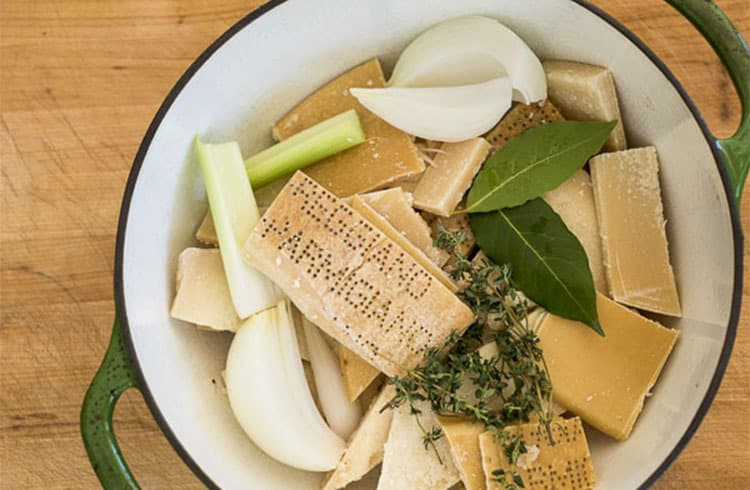

Planet Cheese is a weekly blog devoted to everything cheese: products, people, places, news, and views. James Beard Award-winning journalist Janet Fletcher writes Planet Cheese from her home in Napa Valley. Janet is the author of Cheese & Wine, Cheese & Beer, and The Cheese Course and an occasional contributor to culture. Visit janetfletcher.com to sign up for Planet Cheese and view Janet’s current schedule of cheese appreciation classes.
One of my first jobs in the food world was working for a French pastry chef. I was just the cashier for his bakery, but I hung out in the back a lot. The best lesson I learned from Marcel was not to waste. He would use his thumb to scrape the last drop of egg white out of the eggshell. (“That’s the profit,” he would tell me.) No wonder I never throw away chard stems or Parmigiano-Reggiano rinds. The cheese rinds add body and flavor to bean soup, and I’ve recently learned that they make amazing stock.
Sarah Scott, a popular Napa Valley caterer, uses a lot of Parmigiano-Reggiano in her business. When she has grated all that she can from a wedge, she tosses the rind into a heavy plastic bag in the freezer, and once she has amassed a few pounds, she makes stock. It takes only an hour or so to pull all the remaining goodness out of those hard, dry chunks and make the kitchen smell like a grilled-cheese sandwich.
Sarah uses the rich broth in soups and risotto. When I spoke to her, she had just made fennel soup with it. I’ve included that recipe below. A mushroom or saffron risotto strikes me as a good use for this creamy stock; for spring, I’m thinking risotto with asparagus tips.
My local Whole Foods sells Parmigiano-Reggiano rinds by the pound. Ask your local cheese shop or deli, or start hoarding your own.
Parmigiano-Reggiano Stock
I have to warn you: Any cheese remaining on the rinds will get soft and spongy during cooking, and some of that gooey cheese will cling to your pot. The cleanup is a pain but worth it.
- 2 pounds Parmigiano-Reggiano rinds
- ½ yellow onion, peeled and halved
- 1 inner celery rib, in 2 pieces
- 1 garlic clove, peeled and halved
- 1 dozen fresh thyme sprigs
- 1 bay leaf
Put the rinds, onion, celery, garlic, thyme and bay leaf in a heavy soup pot. Add cold water to cover the rinds by 1 inch (about 2-1/2 quarts). Bring to a simmer over medium heat, stirring often to keep the rinds from settling. Cover partially, adjust the heat to maintain a bare simmer and cook for 1 hour.
Let the stock cool, then strain. Refrigerate the stock overnight, then lift off the congealed fat. Use the stock within a couple of days, or freeze for longer storage.
Makes about 1-3/4 quarts
Sarah Scott’s Fennel and Parmesan Soup

This soup would make an appealing first course before a holiday roast, like prime rib or leg of lamb. Make the stock a day ahead to allow time for degreasing.
- 1 tablespoon extra virgin olive oil
- 1 tablespoon unsalted butter
- ½ large yellow onion, thinly sliced
- 1 large fennel bulb, quartered and thinly sliced crosswise
- ½ teaspoon fennel pollen (available at spice shops; optional but desirable)
- Kosher or sea salt
- 1 teaspoon Pernod or Pastis
- 3 to 4 cups Parmigiano-Reggiano stock
- Freshly ground black pepper
Heat the olive oil and butter in a heavy soup pot over medium heat. Add the onion, fennel and fennel pollen and stir to coat with oil and butter. Season with salt. Cover and cook, stirring occasionally, until the onion and fennel are softened, about 10 minutes, lowering the heat as needed to keep them from browning. Add the Pernod and cook for 1 minute, uncovered, then add 3 cups stock. Bring to a simmer, cover partially and adjust the heat to maintain a gentle simmer.
Cook until the fennel is tender, 10 to 15 minutes. Puree in a blender or food processor until completely smooth, adding more stock if the puree is too thick. Return the soup to a clean pot, season with salt and pepper, and reheat to serve.
Serves 4




